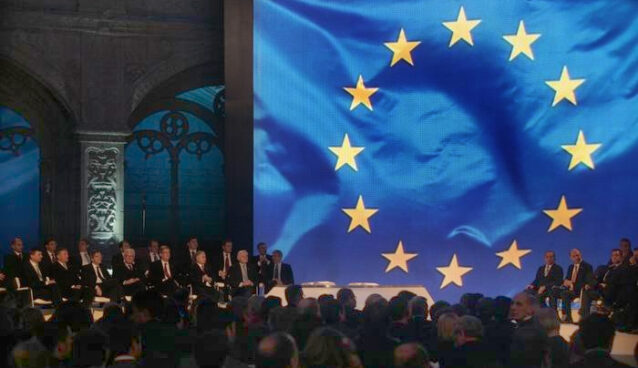The Undemocratic Path Of EU Integration

Have you ever considered that prior to the 2016 referendum the UK electorate were only ever consulted on remaining in a trading bloc called the European Communities? Even that nod to democracy was only offered after Ted Heath signed us up without asking first.
The Treaty of Accession to the European Communities (EC) was signed by Edward Heath in 1972. Heath had been pursuing membership for over a decade and an earlier attempt to join in 1961 had been blocked by French President DeGaulle. Finally in 1972 the UK was accepted. At the time Labour’s Peter Shore was a most vocal opponent stating that the treaty “would deprive the British Parliament and people of democratic rights which they have exercised for many centuries” and grant other countries “the right in perpetuity to levy taxes upon us and decide how the revenues of those taxes should be spent.” This happened without any people’s referendum in the UK.
The 1975 UK Referendum was following a Labour win in the 1974 General Election. Harold Wilson held the referendum to honour an election promise. Since then it’s become known that the former PM, Ted Heath, knew all along the intended long term goal of the EC was to become something far more integrated than merely trade, but this information was deliberately kept from the electorate since it was believed they would have voted to leave way back in 1975 had they known. The referendum result then was decisive that the UK would remain in the European Communities (EC).
Further treaties which moved sovereignty away from the UK and moved us from a trading bloc to a political union were subsequently signed without consulting the electorate in a referendum – the ‘keep it away from the electorate because they’ll say no’ legacy of Heath continued for decades, though Parliament after Parliament approved each one:
The Single European Act (SEA) was signed under Thatcher in 1986. Ostensibly this was about improving free trade and set the European Community the objective of creating a single market by the end of 1992, however it also codified European Political Cooperation (aka foreign policy coordination among signatories) until it was superseded by a later treaty. Non-trade commitments were beginning to creep in. This happened without any people’s referendum in the UK.
Although not an EU founding treaty, Thatcher reluctantly signed the UK up to the European Exchange Rate Mechanism (ERM) in 1990 after pressure from Europhiles in her Cabinet. The purpose of the ERM was to even out variations in currency exchange rates in preparation for the introduction of the Euro. As it happens the UK never did adopt the Euro, though Cabinet pressure in 1990 did push us in that direction. This happened without any people’s referendum in the UK.
The Maastricht Treaty followed and was signed under John Major in 1992, as a Prime Minister who had not yet faced a General Election, being installed as PM mid term as part of a Tory leadership change. Major had taken over as PM two years earlier following a Europhile Cabinet coup against Thatcher who had become more Eurosceptic by then. There’s every chance Thatcher would not have signed up to Maastricht and the UK would have taken a different direction back then. However the Europhiles had acted to remove her and John Major was in charge. The Maastricht Treaty’s real name was the “Treaty on European Union” – that’s right, it was the EU’s founding treaty. It was only in 1992 that the EU actually came into existence, and was signed under John Major without any people’s referendum in the UK and before he faced the electorate in a General Election as Prime Minister (the election did not happen until 3 months after he took us into Maastricht). The previous referendum was 17 years earlier and on a different issue, the next referendum would not be for another 24 years. Did any of the electorate vote to join the EU? No.
The Treaty of Amsterdam amended the Maastricht Treaty and was signed under Tony Blair in 1997. As part of this treaty Blair authorised the transfer of many powers from the UK’s national government to the European Parliament instead. This included legislating on immigration, adopting civil and criminal laws, enacting foreign and security policy, as well as implementing institutional changes for EU expansion. This happened without any people’s referendum in the UK.
The Treaty of Nice amended the Maastricht Treaty and was signed under Tony Blair in 2001. This treaty made changes to EU mechanisms to aid EU expansion into Eastern Europe. Opponents said it was a technocratic treaty that would concentrate power into the EU’s unaccountable bureaucracy and further reduce the sovereignty of national and regional parliaments at home. This happened without any people’s referendum in the UK. (By contrast the Irish electorate were offered a referendum and rejected the treaty. However, later when the referendum was re-run, after Irish regulations, requiring equal air-time and a leaflet with yes and no arguments for every household, were removed, the Irish voted to accept the treaty. Perhaps those in favour of the treaty were able to promote harder than those against now that pesky parity rules were revised to make it easier for pro-EU campaigners to win.)
The Treaty of Lisbon amended the Maastricht Treaty and the Treaty of Rome and was signed under Gordon Brown in 2007 who, like John Major, had not yet faced the electorate in a General Election as Prime Minister at the time it was signed. Brown was installed as leader mid-term as part of a Labour leadership change. It’s worth dwelling on the dodgy origins of the Lisbon Treaty to see how very undemocratic the process of getting us tied to the EU really has been. The Treaty of Lisbon, among other things, brought into law much of the proposed ‘Constitution for Europe’ through the back door after it was clear voters did not want it. The ‘Constitution for Europe’ had previously been explicitly rejected by French and Dutch voters in their own referendums two years earlier. So, re-labelled within the Lisbon Treaty, it was pushed through again in those countries but this time without a referendum. (When the voters say “No” the EU responds by not asking next time except if they think they can get a “Yes” – then they never ask that question again). While France and the Netherlands were having the thing they specifically rejected sneaked past them, the Irish did have a referendum on the Lisbon Treaty, and they said “NO” (just as France and the Netherlands had – when they were asked), but rather than accepting ‘Lisbon’ wasn’t wanted Ireland was infamously made to vote again. (Sound familiar?) On ‘Lisbon’ there was no referendum in the UK at all. Repackaging much of the EU Constitution within the ‘Lisbon Treaty’ was actually rather convenient for Gordon Brown as it provided him the excuse to not deliver the referendum which Labour had promised on the EU Constitution. This allowed Brown to call it a different document – though materially it contained much of the same – and so no referendum was held on that technicality. Imagine if the UK had been given a referendum then, and it had been both Ireland and the UK saying “NO” at the same time. …and this is why they don’t ask us very much very often. (Being asked is something Remainers only complain about when we *are* asked and answer ‘wrong’… then they suddenly want loads of votes until we get it ‘right’, otherwise they are firmly in the ‘act without asking’ camp.) About all the Gordon Brown shenanigans William Hague admitted we would lose sovereignty and voice, he also admitted: “People have never been consulted or voted in a general election for this. The British people have never even voted once, and we will not let people forget whose responsibility that is.” …Labour and Gordon Brown. At the time Daniel Hannan MEP said that the signing was a step towards a European super-state: “The boot continues to stamp on the human face”.
On the plus side, the Lisbon Treaty finally gave member states the explicit legal right to leave the EU and a procedure for doing so. Our opportunity was here.
The 2016 UK Referendum was a long awaited day. It had been more than 40 years since any referendum on dealing with Europe and as for EU membership we had never been asked. Fearing that UKIP’s growing popularity would split the Tory majority and allow Labour to gain power Tory PM David Cameron promised a referendum on the continued membership of the EU should his attempt to gain concessions fail. He failed and the UK Parliament voted to give the electorate a referendum. Cameron was explicit, as was the £9m government leaflet we all received, that through this referendum the electorate would have the final say, “no ifs, no buts”. Throughout the campaign the best and worst possible outcomes of leaving the EU were put forth by all sides. When the day came the UK voted to leave the EU by a decisive majority.
What happened over the last 3 years is well known. We’re still waiting to leave. Remainers continued to campaign as if the vote was still to come. They still campaign today, to variously ignore the vote as they did in France and Holland, re-run the vote as they did in Ireland, anything but actually enact the outcome of the referendum – the only referendum we’ve ever had on EU membership at all. Having reviewed the whole awful undemocratic path we’ve taken to EU integration, it comes as no surprise that many Remainers still prefer the undemocratic route. They want Parliament to overrule the people, they want to reject the vote, they want to vote again until they win and then lock the ballots, they want to take to the streets, they want to disrupt. Anything but accept the democratic outcome of the referendum. Even Parliament seems bent to reject the majority will and like the Parliaments before many sitting there side with transferring power away from itself, not to the people, but to the EU. Over 40 years of leaving it to Parliament and never consulting with the people has resulted in where we are today. And at once, when the people are finally consulted, it is discovered that the people and Parliament disagree, that the people want to leave the EU, but many in Parliament do not. And so we now have many in Parliament calling MPs voting ‘democracy’, we hear them wailing about Parliamentary sovereignty – just enough for them to hand it all over to the EU – while utterly rejecting the popular vote, voice and sovereignty of the people who put them there.
The irony of all this, when you add it all up, is that Remainers and MPs who are crying out to not leave without a deal, are all basically saying this: ‘we want to be members of the EC trading bloc again’. Unfortunately, as Cameron found out, as Parliaments and Prime Ministers over the decades ensured, but without a mandate from the people, the EC trading bloc no longer exists. If only Thatcher, Major, Blair and Brown had held referendums back then it could have been so different.
Yet, it cannot continue, we cannot fail, or meaningful democracy in the UK is lost forever. Parliament must know they work for us, not the other way around. It’s time to leave the EU.
(Note: All this ignoring of votes, acting without votes, sneaking past voters things they had rejected, Remainers call ‘no loss of sovereignty’.)
